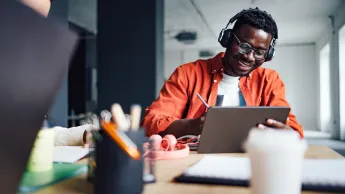Innovative ideas to counter the education crisis
- 2024-10-15
- Ulrike Scheffer
- Comment

Digital tools modify learning. Our Community Challenge 2024 saw the recognition of Germany alumni’s outstanding ideas regarding inclusive and equitable education. Three projects in particular were able to prevail during the pitching event and will now receive comprehensive mentoring to further develop and realise their concepts.
An alumna from Pakistan, an alumnus from Kosovo and a multinational team from Kosovo and Turkey have won the . At the end of September, the eight Challenge finalists presented their ideas on the topic: ‘The future of education: how digital solutions are revolutionising the world of learning’. A jury of Community experts selected the best projects at the online event. A total of 31 individual candidates and teams took part in the Challenge.
Many participants want their projects to help limit the damaging consequences of the coronavirus pandemic on children and young people. Children around the world were unable to attend school for weeks and months during the pandemic. In addition to schooling deficits, this also affected young people’s mental health. Fear, boredom and loneliness caused mental disorders in children and young people worldwide. Many children couldn’t even return to school after the pandemic, because their parents no longer had the means to finance their schooling.
‘The education system needs to keep pace with digitisation’
Germany alumnae and alumni around the world are experiencing these education crises in their own countries with great intensity. Many are considering how the education opportunities of those affected can be improved. It was therefore obvious that the Community Challenge 2024 should focus on this topic, which also targets SDG 4: the commitment to ensure inclusive and equitable quality education and promote lifelong learning opportunities for all.
Benjamin Wüstenhagen, DAAD alumnus, social entrepreneur and developer of digital learning platforms, has however also identified issues in international education systems even beyond the coronavirus. He used an introductory talk to the Challenge pitches to criticise the fact that education systems are failing to keep pace with digitisation. Schools in general have neither the necessary digital equipment nor are they developing digital learning methods sufficiently quickly. ‘Even many European classrooms don’t have fast internet’, he says. Teachers are also felt to be inadequately trained in the use of digital tools during their lessons. Schools are basically missing the opportunity to take account of pupils’ individual abilities and needs.
Gamification fosters joy in learning
The Community Challenge participants address precisely this issue. Most of the projects use artificial intelligence (AI) to personalise educational opportunities. Zamira Khan from Pakistan was compelling in this year’s Challenge with her idea for building a global digital network that is shared among teachers around the world. seeks in particular to use this service to reach pupils who so far haven’t had access to high-quality education. This network uses blockchain techniques and AI to tailor lessons to the users’ individual needs. A reward system is also intended to foster fun in learning.
Interactive platforms for increased education opportunities
Erlis Lushtaku from Kosovo, who is also a Challenge winner, dealt with a highly tangible application of digital learning aids. is intended to assist architects and designers in their work and help them to refresh their technical knowledge. It has an AI assistant that automates design tasks. The interactive tool can be used to resolve design issues by referring to the latest technical information, which can be adopted. ArchCopilot also functions like a game.
The third winning team also relies on a game-based platform. Aurora Mullatahiri, Princ Mullatahiri and Boğaçhan Emre Uysal from Kosovo and Turkey developed a board game that is played via an app. offers different game plots that convey learning content for various age groups. It therefore combines fun and education.
The Challenge winners can now look forward to comprehensive mentoring, which is intended to help them convert their idea into a marketable product. Because it's ultimately vital to attract investors to fund the project. But those who presented the other five ideas that were at the pitching event didn’t leave empty handed: as finalists, they will also receive individual coaching – albeit not quite so comprehensive.
Projects need to grow
Last year’s Challenge winner, from Bosnia-Herzegovina, gave an account during the pitching event of his experiences in implementing his project. ‘You make mistakes and repeatedly face new obstacles that have to be overcome’, is how he describes his journey since the Challenge. In 2023, it was ideas for that were sought. Asad Karišik wants to use an AI-powered platform with micro-mobility services such as e-scooters to interlink local public transport and thus motivate drivers to switch to eco-friendly modes of transport. He advised participants in the 2024 Challenge to really engage in the mentoring and be open to advice and suggestions for improvement. He has in the meantime improved his concept so that it’s expected to be ready for investors at the end of this year.
